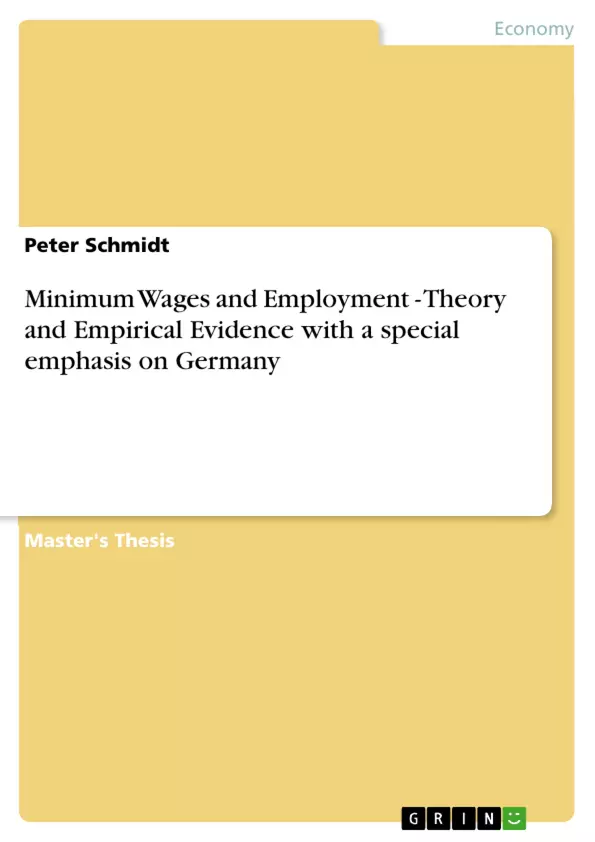One of the most important issues that was in the center of the political debate in Germany in the last few months is the introduction of minimum wages. It was caused by the politically forced imposition of a minimum wage in the sector for postal services which, in the view of many experts, provides a
competitive advantage for the major postal service company “Deutsche Post World Net”1 compared to its competitors. Then it happened that the “PIN – Group AG” one of the most important domestic competitors of the “Deutsche Post World Net” was threatened by insolvency as its largest shareholder the
publisher “Axel Springer AG” was no longer willing to invest money in the “PIN - Group AG”. Additionally, many newspapers published by Axel Springer AG wrote articles against the imposition of a minimum wage for many weeks and published many interviews with economic experts warning about the
negative effects of a minimum wage on the overall German labor market. Furthermore, political considerations, e.g. by the secretary of labor, to introduce a federal minimum wage in Germany even caused the chairmen of the eight leading economic research institutes in Germany to publish a letter in the
newspaper “Das Handelsblatt”2 where they advise politicians against the introduction of a federal minimum wage if (large) employment losses should be avoided. On the other hand, a few other researchers, experts and politicians like the “IAB”3 as a specific labor market research institute believe
that minimum wages even could create jobs and must not necessarily destroy them. This paper is motivated by this ongoing debate between economists and policymakers in the whole world.
That is why in the first part of the paper the major theoretical framework which is used by economists to analyze and empirically assess the impacts of minimum wages on employment should be presented.
Inhaltsverzeichnis (Table of Contents)
- 1. Introduction
- 2. The Theory of Minimum Wages
- 2.1. The Basic Competitive Labor Market Minimum Wage Model
- 2.2. The Model with Endogenous Effort
- 2.3. An Efficiency Wage Model
- 2.4. A Two-Sector Model
- 2.5. A Two-Sector Model with Searching for Covered-Sector Jobs
- 2.6. The Monopsony Model
- 2.7. The Oligopsony Model
- 2.8. "Shock" Effects
- 2.9. Heterogeneous Workers
- 2.10. Lagged or Leaded Adjustment
- 3. The Empirical Evidence on Minimum Wages
- 3.1. A Short History of Empirical Research on Minimum Wages
- 3.2. The Minimum Wage Debate: Card, Krueger, Katz versus Neumark and Wascher
- 3.3. Main Issues Raised about the Three Papers
- 4. Minimum Wages in Germany
- 4.1. Research on Minimum Wages in Germany
- 4.2. State of Affairs in the German Minimum Wage Debate
Zielsetzung und Themenschwerpunkte (Objectives and Key Themes)
This paper examines the impact of minimum wages on employment, focusing particularly on the German context. It aims to provide a theoretical and empirical overview of the debate surrounding minimum wages, analyzing various economic models and empirical studies to assess their effects on employment. The paper will also evaluate the ongoing discussion in Germany regarding minimum wage implementation.
- Theoretical frameworks for analyzing minimum wage effects on employment.
- Empirical evidence on the impact of minimum wages on employment, including key studies and debates.
- The German context: research on minimum wages and the current state of the debate.
- Comparative analysis of different theoretical models regarding minimum wage impact.
- Evaluation of the arguments for and against minimum wage implementation.
Zusammenfassung der Kapitel (Chapter Summaries)
Chapter 1: Introduction introduces the ongoing debate surrounding minimum wages in Germany, particularly regarding the postal service sector and its impact on competition. It highlights the conflicting viewpoints among economists and policymakers on the effects of minimum wages on employment.
Chapter 2: The Theory of Minimum Wages presents various theoretical models to analyze the effects of minimum wages on employment, including models of perfect competition, monopsony, and efficiency wages. Each model offers a different perspective on how minimum wages affect labor demand and supply.
Chapter 3: The Empirical Evidence on Minimum Wages provides a historical overview of empirical research on minimum wages and examines key studies with contrasting conclusions regarding their impact on employment. The chapter also discusses some of the methodological challenges in this area of research.
Chapter 4: Minimum Wages in Germany focuses on existing research and the ongoing debate on minimum wages within the German context. It explores the specific arguments and considerations relevant to the German labor market.
Schlüsselwörter (Keywords)
Minimum wage, employment, labor market, Germany, economic models, empirical evidence, monopsony, perfect competition, efficiency wages, employment effects, policy debate.
- Quote paper
- M.A. (USA) Peter Schmidt (Author), 2008, Minimum Wages and Employment - Theory and Empirical Evidence with a special emphasis on Germany, Munich, GRIN Verlag, https://www.grin.com/document/121801



